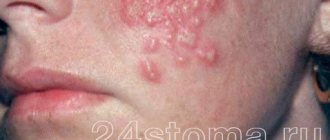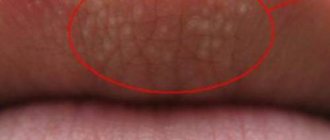Every mother dreams of giving birth and raising a healthy baby. Unfortunately, there are many dangers along the way of pregnancy, and one of them is the herpes virus, which is familiar to many. The virus can manifest itself in different ways: from itchy sores on the lips, poisoning a comfortable life, to the development of serious health-threatening conditions. In pregnant women, relapses can occur especially often, which is due to a natural decrease in immunity during pregnancy. During this difficult period, the expectant mother's immunity levels decrease. This condition is called physiological immunosuppression, which, on the one hand, helps to bear a child without rejecting him, and on the other, makes the body susceptible to various infections. Despite the fact that herpes on the lips is not considered a serious disease by most, herpes viruses can have an adverse and even fatal effect on the course of pregnancy and childbirth, leading in some cases to damage to the fetus.
- Herpes on the lips during pregnancy
- Why is herpes dangerous during pregnancy?
- An important aspect of protecting the body from viruses and germs
- Herpes during pregnancy. Is it possible to resist him?
- How to behave if the disease manifests itself
- How does the virus enter the body and why is it activated?
- Herpes zoster during pregnancy
- Who needs a herpes diagnosis?
- Herpes treatment regimen
- Effects of therapy with VIFERON
Herpes on the lips during pregnancy
The herpes simplex virus (Herpes simplex virus) of the first and second types is constantly present in the body in most people after infection in early childhood and under unfavorable conditions can be activated. It is known that by the age of fifteen, 80% of children and adolescents are infected with one or another herpes virus, and by the age of 30, 90% of people have antibodies to different types of this virus. The most common sites for infection are the genital area and surrounding skin, such as the buttocks, perineum, and face. Single or grouped itchy blisters appear on/on the nose, lips, cheeks, mouth, and on the mucous membrane of the eyelids. Recurrences of herpes during pregnancy are a very common occurrence, since a woman’s immune system during this period may not be able to cope with the virus that has once settled in the body.
In what types does the disease manifest itself?
Cold sores during pregnancy can have several manifestations. Naturally, it does not occur in any form. They can differ noticeably from each other, and ultimately affect both the course of the pregnancy itself and the development of the fetus as a whole.
If a woman expecting a child already had herpes rashes on her lips before pregnancy, then the probability of transmitting this virus to the fetus will be no more than 5%. If a woman did not come into contact with the herpes virus until she became pregnant, and the infection occurred while she was expecting a child, then the probability of a negative effect on the fetus immediately reaches 90%. Here you cannot do without medical help, because a timely response to such a manifestation can save the child’s life.
Doctors divide the existing manifestations of herpes into several types. These include:
- Primary form of the disease. It is carried out at the moment when a woman first becomes infected. It appears when the body does not have antibodies that can fight pathogens. Usually occurs at the moment when herpes on the lips appears for the first time during pregnancy, and the woman has not yet had it.
- Recurrent herpes. Infection occurs even before pregnancy. The disease manifests itself when immunity decreases, and symptoms of the disease appear accordingly. If you conduct a blood test at this time, you can note that there are herpes antibodies in the body.
- Asymptomatic transmission of the virus. In this case, the virus will spread inside the woman’s body, transmitted from cell to cell. At the same time, none of the symptoms of the disease will show themselves. It is possible that even herpes on the lip will not appear during pregnancy, but the woman may be infected.
We recommend reading: Kefir face mask
Why is herpes dangerous during pregnancy?
The greatest danger is posed by primary infection with herpes during pregnancy. Due to the absence of antibodies protecting against herpes in the mother’s body, the situation is characterized by more pronounced manifestations. For the fetus, the risk is especially high when infected with genital herpes in the first and third trimesters. Infection of the fetus in the first trimester leads to severe consequences, but such cases are extremely rare, since with the primary infection of a pregnant woman up to 10 weeks, as a rule, spontaneous termination of pregnancy occurs. The situation is considered extremely unfavorable in the case of primary infection in the second and third trimesters. However, primary infection in the second half of pregnancy almost always has a clear manifestation, which allows immediate action to be taken. HSV, while in the body, certainly reduces the “reserve” of health originally provided by nature. However, in the process of interaction with the virus, antibodies are formed that are passively transmitted to the newborn from the mother. With recurrent herpes or carriage of the virus, the risk to the fetus is assessed as minimal, since maternal antibodies help cope with the infection even in the event of an active relapse. With this form of infection, the virus is released less than with the primary one.
What should pregnant women do?
Considering that the signs of herpes are immediately visible, especially in expectant mothers who have encountered such a disease, it is necessary to immediately begin to eradicate this manifestation. Initially, you should forget about self-medication, because a cold on the lip during pregnancy can be just as dangerous for babies as other diseases of the expectant mother. Only a gynecologist will be able to optimally prescribe treatment, based on what week of pregnancy the woman is in, what the activity of the virus is, at what stage of the disease and what type of virus is in the body.
Many medications are now contraindicated for pregnant women, in particular, this also applies to herpes medications. Therefore, it is necessary to select medications that will help eliminate the manifestation of the disease and not harm the unborn child. There are products that are available in the form of ointments, gels or creams for use on the skin. Tablets and other medications used internally are very rarely prescribed during pregnancy. Popular antiviral drugs are Acyclovir, Herpevir, Zovirax. They are applied to the place where inflammation occurs, and the active substance will not penetrate the blood and placenta, so such medications are suitable for treatment.
It is important to remember that in addition to medications, to fight the virus it is necessary to take vitamins, microelements, strengthen and improve immunity. Then the likelihood of disease and abnormal fetal development is minimized. A large role will be played by adequate and healthy sleep, strengthened immunity, and proper preparation of the diet of a pregnant woman.
The likelihood of herpes can also be minimized if you adhere to the rules of personal hygiene and do not pick off blisters and crusts that have formed. This can only cause more harm to both yourself and the unborn child and become self-infected again. If the disease is detected in time and its treatment is not started too late, it will disappear after a maximum of a week. Afterwards, it is necessary to undergo an ultrasound examination again to make sure that everything is fine with the child; it is also necessary to be under the supervision of a doctor and constantly follow his recommendations.
We recommend reading: Laminaria face mask. Composition, beneficial properties of kelp
An important aspect of the body's defense system against viruses and microbes
In the process of evolution, humans have developed various defense mechanisms that allow them to resist various infections. Thus, the interferon system IFN is one of the most important factors of the body’s resistance, participating in various immunological reactions. Interferons are a group of biologically active proteins or glycoproteins synthesized by the cell in the process of a protective reaction to foreign agents, which include viral infection. Currently, the concept of “interferon system” (SI) has emerged. It does not belong to any specific organ, but exists in every cell, so all of them can be infected with a virus and must have a system for recognizing and eliminating foreign genetic information. SI is configured to recognize “self and foe” and is “built-in” into almost all cells of the body, which allows it to actively influence the entire cascade of the body’s defense reactions from phagocytosis to inflammation, which makes it an important factor in nonspecific resistance. As a result of the study of interferons, their role was determined: control and self-regulation of processes in the body. The main effects of interferon protection: antiviral, antimicrobial, immunomodulatory, preventing excessive cell proliferation, protection against radiation and others. Herpesvirus infections cause an imbalance in the interferon system, inhibit the cellular and phagocytic reactions of the body (prevent the detection, absorption and removal of viral particles). Restoration and normalization of the body’s defense mechanisms is the preventive task of antiviral therapy.
Herpes during pregnancy. Is it possible to resist him?
What can be advised to those who, with the help of approved medications, seek to stop herpes during pregnancy? VIFERON is an antiviral drug that can be taken by expectant mothers. One of its properties is a wide range of antiviral activity due to the presence of interferon in the drug. That is, you can start using it already at the beginning of symptoms. This can stop the disease at the very beginning, while the virus has not yet multiplied and affected healthy cells. Doctors prescribe VIFERON for herpes during pregnancy to compensate for the lack of its own interferon and enhance antiviral protection. Already from the 14th week of pregnancy, VIFERON Suppositories are allowed in a dosage of 500,000 IU. It is prescribed for primary or recurrent herpetic infection of the skin and mucous membranes, with a localized form, mild and moderate course, including the urogenital form of infection.
I caught a cold, and lo and behold, my lips were covered. Give me some tea for colds
You are confusing two completely different infections - respiratory and herpes. A cold, or ARVI, develops when the body is infected with respiratory viruses. But a “cold on the lips,” or a relapse of orolabial herpes, appears when the herpes simplex viruses, which live in the body constantly, are activated. Therefore, when itching or rash appears on the lips, traditional cold remedies are not effective: they only act on the symptoms of acute respiratory viral infections or respiratory viruses. In the case of “cold lips,” it is advisable to use antiviral drugs that are active against herpes simplex pathogens.
How to behave if the disease manifests itself
Speaking about household habits, it is worth noting that hand hygiene during a relapse of herpes is very important. Do not touch the affected area with your hands, because the infection can be transferred from the face to the genital area. Infection of the birth canal before childbirth may lead to a caesarean section. Herpetic infection in pregnant women requires mandatory treatment under the supervision of a specialist. If a pregnant woman is surrounded by someone with signs of infection, close contacts should be avoided: kissing, sex, and you should not share dishes, linen, or towels with the patient.
Recommend something effective to get rid of this herpes once and for all
Unfortunately this is not possible. Once entering the body - most often this happens in childhood - herpes simplex viruses never leave it. They penetrate the nerve ganglia of the trigeminal nerve and migrate from them only during relapses, and then return again to the zone of permanent “dislocation”. Activation of the infection occurs against the background of a number of risk factors, or triggers. They can be: fever, stress, fatigue, hormonal changes, respiratory infections, etc. By the way, with age, the frequency of relapses of orolabial herpes decreases.
There is no remedy that would allow you to get rid of herpes infection at once. However, there are drugs that alleviate the condition during the activation of the disease and speed up recovery. These are primarily acyclovir-based products that block the proliferation of herpes viruses. Acyclovir ointments and creams are the drugs of choice for recurrent colds on the lips, having an optimal balance of effectiveness and safety.
How does the virus enter the body and why is it activated?
Of the eight types of herpes viruses known today, the cause of rashes on the lower part of the face and genitals are usually HSV-1 (mainly herpes labialis) and HSV-2, which has more dangerous consequences. Transmission of HSV-2, as a rule, occurs through sexual intercourse, but vertical transmission is also possible - from mother to child during childbirth. Moreover, if a pregnant woman is infected for the first time, then the risk of neonatal herpes in the baby is 50 to 50, and in case of relapse, only 3-5% of children are born with signs of herpes infection. With the vertical mechanism of infection, the fetus is infected through maternal blood during childbirth, or the virus enters the pregnant woman’s uterine cavity from the cervix. At the same time, a high level of immunoglobulin proteins in the blood (antibodies) can protect the fetus from intrauterine infection. Cellular immunity also plays an important role in preventing the recurrence of herpes. In turn, the frequency and intensity of relapses depends on the state of local (mucosal) immunity. When there is a malfunction in the immune system, there are exacerbations of herpes infection. Injuries, surgeries, cosmetic procedures, sexual contacts that injure the mucous membrane, and taking certain medications can trigger a relapse. With reduced levels of T-cell immunity, conditions are created for the virus to multiply in cells. Interferon deficiency plays a significant role in the pathogenesis of herpes. In foci of herpetic lesions, local suppression of interferon formation is noted. VIFERON for herpes during pregnancy in the form of Suppositories can be taken starting from the 14th week, however, local forms such as Gel and Ointment have no restrictions on the duration of pregnancy. They are used directly on the affected areas: skin and mucous membranes.
Recommend some remedy for cold sore lips for a pregnant woman
Unfortunately, first-line drugs for the treatment of exacerbations of orolabial herpes are indicated for use during pregnancy only if the benefit to the mother outweighs the risk to the fetus and child [2]. Expectant mothers can be encouraged to use a lip balm or cream with a UV filter - it protects the skin of the lips from the negative effects of ultraviolet radiation, which is considered one of the triggers for relapses of herpes. Additionally, I would recommend lip moisturizers to prevent dry skin.
Herpes zoster during pregnancy
Herpes zoster (herpes zoster, herpes zoster) is a viral disease of the skin and nervous tissue that occurs due to reactivation of the herpes virus type 3. Primary infection with the Varicella-zoster virus usually manifests itself as chickenpox. People with immunosuppression have a much higher risk of getting the disease than those with normal immunity. The main symptom is severe, prolonged pain, which may precede the rash. Pregnant women may experience severe complications. Infection in the first trimester will most likely lead to primary placental insufficiency and miscarriageii.
Avoiding illness
To ensure that herpes infection does not become something unexpected, it is necessary to adhere to certain preventive measures, and they must be started before conceiving a child. These rules include:
- Donating blood for analysis and detection of herpes.
- Constant observance of personal hygiene rules.
- The right approach to planning a child, given that both parents must undergo a full examination.
- Maintaining immunity at a high level.
- Timely treatment of infectious and viral diseases.
- Hardening.
- Minimizing bad habits or completely abandoning them.
Diagnosis of herpes, who needs it
When planning a pregnancy, it is recommended to be tested for this infection, which is dangerous for the fetus, since herpes can have an atypical form, in which there is no itching and burning, and there are no vesicles. The reason for diagnosis may also be a history of herpetic rashes of any localization, erosive or vesicular rashes on the skin, buttocks, thighs, mucopurulent discharge from the vagina, or sexual contact with a partner who has this disease, as well as frequent changes of partners. Particular attention is required for women with a burdened obstetric history, those who have already suffered perinatal losses or have given birth to a child with congenital defects. Pregnant women with signs of intrauterine infection determined by ultrasound should undergo testing.
Treatment regimen:
Pregnant women from the second trimester of pregnancy (starting from the 14th week of gestation) are recommended to use the drug VIFERON® 500000 IU, 1 suppository 2 times a day every 12 hours for 10 days, then for 9 days 3 times with an interval of 3 days (on the fourth day) 1 suppository 2 times a day every 12 hours. Then every 4 weeks until delivery VIFERON® 150,000 IU, 1 suppository 2 times a day after 12 hours every day for 5 days. If necessary, before delivery (from the 38th week of gestation), the use of the drug VIFERON® 500,000 IU, 1 suppository 2 times a day after 12 hours every day for 10 days. Ointment for local and external use (interferon content 40,000 IU) is applied in a thin layer to the lesions 3-4 times a day and rubbed in gently. Duration of therapy – 5 – 7 days. You can also use Gel (interferon content 36,000 IU). A 0.5 cm strip is applied using a spatula or a cotton swab/cotton swab to a previously dried affected surface 3–5 times a day for 5–6 days; if necessary, the duration of the course is increased until the clinical manifestations disappear. It is advisable to start therapy at the first signs of relapse: tingling, redness, itching.
Colds during pregnancy: how to treat?
Any cold or respiratory disease in the early stages of pregnancy, during the primary formation of the fetus, can lead to unpredictable consequences and complications. The matter is complicated by the fact that most medications are absolutely contraindicated for use during pregnancy.
In this regard, treatment and prevention of colds in pregnant women is an important issue that should be approached especially responsibly! The main message is: be careful with medications and use gentle preventative measures based on alternative medicine methods to avoid respiratory diseases and flu.
"One for two - immunity"
This is a very fragile system; there is no need to interfere with its work, but it is necessary to support and strengthen it. Pregnancy belongs to the category of special, even temporary, conditions during which a woman needs additional protection.
Simple recommendations that are available to everyone will help in this matter:
• During periods of frequent weather changes, it is necessary to dress warmly, paying special attention to shoes. • During an epidemic, it is better for a pregnant woman to refrain from being in crowded places - transport, metro, shops and hospitals. If there is an urgent need, to prevent possible infection, you should wear a protective respiratory mask before leaving the house.
• It is necessary to observe the rules of hygiene especially carefully after visiting the street and public places. When you return home, the first thing you should do is wash your hands thoroughly.
Interesting:
More than 90% of all acute respiratory infections are caused by viruses, about 10% are caused by bacteria and other pathogens.
Accordingly, you can use any soap, not necessarily antibacterial. • Before going outside, you can lubricate the nasal mucosa with oxolinic ointment.
Upon returning home, rinse the upper respiratory tract with soda solution. • Rationalization of nutrition and intake of vitamins will strengthen immune defense. Eating fruits and vegetables that are enriched with vitamins and have not undergone heat treatment is especially beneficial.
Interesting:
Our grandmothers also said: in order not to get sick, you need to drink chicken broth! Strange, but until recently scientists did not attach much importance to this preventive measure. Pulmonologist Stefan Rennard decided to find out whether this is true or not. The professor conducted a study and proved that drinking chicken broth affects the mobility of neutrophils, white blood cells that protect the body from infections and activate the immune system.
- Vitamins can be taken using ready-made pharmaceutical multivitamin complexes. Before choosing a drug, you should consult your doctor.
- Compliance with sleep schedule and duration - at least 9 hours a day. The possibility of traumatic situations should be minimized.
- Maintaining cleanliness in the living area (ventilation, wet cleaning).
- Air humidification is an important aspect in preventing flu and respiratory diseases. If a pregnant woman's home uses air conditioners or heaters, it would be best to purchase a mechanical humidifier.
Preventive medications
- Grippferon is a drug in the form of nasal drops that prevents and treats influenza and is not contraindicated for pregnant and lactating women. The medicine stimulates increased immunity and has a pronounced antiviral effect that can protect against colds, infections and types of influenza.
- Ascorbic acid - can be used as a separate source of vitamin C in a synthetic version, with a reduced daily intake from food. Ascorbic acid not only prevents infection, but also fights viruses that have already entered the woman’s body.
- Viferon is a nasal ointment that is prescribed to prevent influenza and respiratory infections during an epidemic. The ointment has protective and immunomodulatory effects, and also allows you to fight disorders that are already occurring in the body at the time of use. Viferon in the form of nasal ointment has no contraindications for use in pregnant women at any stage, including the first trimester.
- Aquamaris is a natural medicinal preparation in the form of a nasal spray that allows you to moisturize the nasal mucosa, thereby reducing the risk of influenza viruses entering the nasal cavity.
I would like to say a few words about such a prevention method as vaccination.
Most often, the expectant mother may be at risk of becoming infected due to the annual
flu epidemic
. This disease is dangerous for a pregnant woman precisely because of its complications: pneumonia, bronchitis, otitis media. Flu in a pregnant woman can also affect the health of the fetus. It is most dangerous in the early stages of pregnancy, when the tissues and organs of the human embryo are laid and formed. Viral intoxication or drug exposure can lead to pathology of the child’s organs. In later stages of pregnancy, there is a risk of infection of the fetus.
The most dangerous consequence of the flu in a pregnant woman is a threatened miscarriage or premature birth!
It is quite natural that expectant mothers often wonder whether or not to get vaccinated.
According to the conclusion of the studies, the use of inactivated (“killed”) influenza vaccines does not have a teratogenic effect on the fetus and does not harm the health of a pregnant woman. After consulting with your doctor about such a vaccination, you can come to the optimal decision.
If a flu epidemic is inevitable and a pregnant woman has no contraindications, then the vaccine should be given. If a pregnant woman has a negligible risk of infection, she does not come into contact with a large number of people, or is opposed to vaccination, then you don’t have to do it. According to research results, it is known that vaccinating a mother reduces the risk of influenza infection in a newborn child by 63%. Seasonal prevention of influenza is carried out in September and October. Vaccinations for pregnant women are recommended from the second trimester of pregnancy.
During the period of planned pregnancy, the flu vaccine is given 1 month before it: the formation of immunity occurs in 2–4 weeks. Protection after vaccination lasts about a year.
If infection does occur, action must be taken immediately if at least one symptom of the disease is detected. The health of a pregnant woman and her unborn child depends entirely on her responsibility and careful attitude towards her own body.
Proven folk remedies will be the first to be used. Since pregnant women should not steam their legs, steam your arms and this will make nasal breathing easier. Wrap yourself up, put on woolen socks and crawl under the blanket: warmth, peace and sleep are good for colds. Don't forget to drink plenty of fluids - hot green tea with lemon and honey, tea with linden blossom, cranberry juice, rosehip infusion, dried fruit compote. Ginger in the form of tea also helps, not only with catarrhal symptoms, but with nausea in the morning.
Various hot milk drinks are also suitable. You can add honey to milk, and it is best to cook it on onions. It should be emphasized right away that not all herbs can be used for colds during pregnancy. Here is a list of medicinal plants that are contraindicated: aloe, anise, barberry, elecampane (herb and root), sweet clover, oregano, St. John's wort, strawberries (leaves), viburnum (berries), raspberries (leaves), lemon balm, lovage, wormwood, licorice ( root), celandine, sage. Accordingly, you should not take medications containing these plants.
The use of medications for colds during pregnancy must be treated with great caution!
The following drugs are contraindicated
: Pertussin, Tussin plus, Joset, Glycodin, Ascoril, Travisil, Broncholitin, ACC, Grippex, Codelac, Terpincode. You should not use lozenges and lozenges for a sore throat or cough; they are also undesirable due to the likelihood of developing allergic reactions.
Pinosol spray, judging by the components indicated in the instructions, is not dangerous during pregnancy. However, the essential oils contained in the drug - Scots pine, peppermint, eucalyptus, thymol, guaiazulen (citvarum wormwood oil) - can lead to an allergic reaction with swelling of the nasal mucosa.
Viferon suppositories can be used only after 14 weeks from the start of conception. This drug contains recombinant human interferon alpha-2, ascorbic acid and alpha-tocopherol acetate and has antiviral, immunomodulatory and antiproliferative effects. It is used in the treatment of various infectious and inflammatory diseases of adults and children (including newborns). In the form of an ointment, Viferon is used to treat herpetic lesions of the skin and mucous membranes. The ointment is applied in a thin layer to the affected areas of the skin 3-4 times a day for 5-7 days.
The homeopathic drug Stodal, which includes mainly herbal ingredients, affects various types of cough and has an expectorant and bronchodilator effect.
Viburkol - homeopathic suppositories - have analgesic, anti-inflammatory, sedative, antispasmodic effects. They are prescribed in the complex therapy of acute respiratory viral infections and other uncomplicated infections (including in newborns), as well as in inflammatory processes of the ENT organs and inflammatory diseases of the genitourinary system.
So, you can try to eliminate a slight ailment on your own, but there are conditions under which you need to call a doctor at home:
- Prolonged increase in body temperature;
- Myalgia, feeling of tiredness, increased fatigue, general broken state;
- Difficulty breathing, the appearance of lumps in the nasopharynx and a dry or wet barking cough;
- A pregnant woman is worried about a severe pressing headache.
In conclusion, I would like to emphasize the importance of treating chronic diseases before pregnancy, a healthy lifestyle while carrying a child, and following all doctor’s orders.
I wish expectant mothers and their loved ones to try to maintain a good mood: optimists live longer and happier, they are more productive. Remember your victories and pleasant moments more often and everything will be fine!
Effects of therapy with VIFERON
“The use of the drug VIFERON® from the 14th week of pregnancy contributed to:
– exclusion of signs of hematogenous infection;
– reducing the frequency of ascending infection by 4.5 times;
– reducing the incidence of pathology in newborns (infectious and non-infectious);
– exclusion of structural changes in the central nervous system in newborns;
– increasing the frequency of births of healthy children by 2 times [1];
According to available data: “The inclusion of the drug VIFERON® in complex therapy helps reduce:
– threats of termination of pregnancy 2 times;
– polyhydramnios and oligohydramnios by 3 times;
– gestosis by 2.5 times;
– the frequency of replicative forms of the virus is 2 times (HSV from 79.3% to 45%, CMV – from 62.2% to 33.3%);
– the frequency of relapses of concomitant bacterial vaginosis is more than 1.5 times (mycoplasma and ureaplasma);
– the total number of non-infectious complications of the perinatal period by 2.5 times (from 28.6% to 12%)
– the total number of cases of IUI in newborns increased 5 times (from 26.7% to 5.2%);
– the incidence of severe forms of IUI doubled (from 25% to 11.3%) [2].
Reference and information material
Author of the article
Belyaev Dmitry Alexandrovich
General doctor
Sources:
- Bocharova I.I., Novikova S.V., Malinovskaya V.V., Vyzhlova E.N., Parfenov V.V. Perinatal aspects of herpesvirus infections // Medical Advisor. Gynecology. 2021.1/(41).
- IN AND. Krasnopolsky, T.G. Tareeva, V.V. Malinovskaya. Monitoring of pregnant women with viral infections of the herpes family // Medical technology. – M. 2021. – 40 p.
i https://www.lvrach.ru/
ii https://medi.ru/
Loading...
Take other surveys










